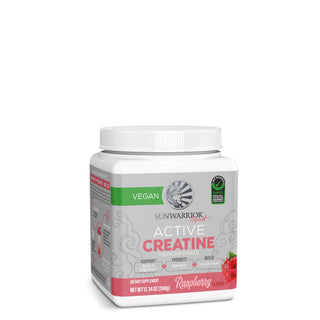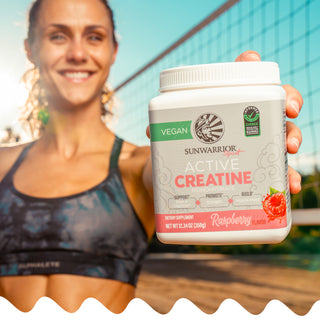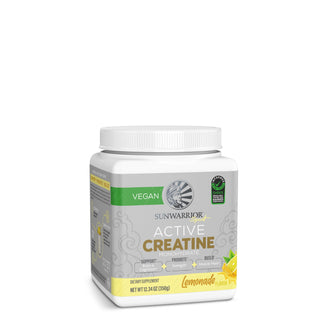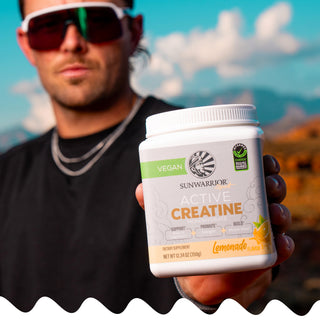By Sunwarrior last updated 8-13-24
In the world of sports and athletics, athletes are continually seeking ways to gain a competitive edge, and Creatine just might be the game-changer in your sports performance to give you that edge.
Whether it's running faster, jumping higher, or lifting heavier weights, the pursuit of peak performance is relentless. This pursuit of athletic excellence is the reason many athletes use creatine for its potential to enhance athletic performance. Let’s talk about the science behind creatine and its numerous benefits in the world of sports.
Understanding Creatine
Creatine is an amino acid and is naturally found in muscles. Your body makes about 1 g of creatine every day in the pancreas, kidneys, and liver. It helps maintain a continuous energy supply as you work your muscles, making it an ideal supplement for athletes who want to perform at their best. The primary role of creatine in the body is to aid in the production of adenosine triphosphate (ATP), the energy currency of cells. It’s an incredible science-backed supplement.
Enhanced Muscle Power
One of the most well-known benefits of creatine supplementation is its ability to boost muscle power and strength. ATP is crucial for muscular contractions, and when you engage in high-intensity, short-duration activities like weightlifting, team sports, or sprinting, your muscles need a rapid supply of ATP. Creatine supplements like Sunwarrior’s Active Creatine help by increasing the phosphocreatine stores in your muscles, allowing you to generate more ATP during these explosive movements. This leads to greater strength and power output, which can directly translate to improved athletic performance.1
Increased Muscle Mass
Creatine's role in muscle growth is another area where it shines. While it doesn't directly stimulate muscle protein synthesis like some other supplements or hormones, creatine indirectly promotes muscle growth by increasing workout intensity. With the ability to lift heavier weights or perform more repetitions, you subject your muscles to greater mechanical tension, which drives muscle growth.
Creatine also draws more water into the muscle cells, creating a temporary increase in muscle cell volume. This cellular hydration not only contributes to a fuller, more pumped appearance but also stimulates muscle protein synthesis. As a result, athletes who supplement with creatine often experience a notable increase in muscle mass over time.1
Improved Exercise Performance
Athletes engaged in sports that require repeated bouts of high-intensity efforts, such as sprinting or jumping, can greatly benefit from creatine supplementation. Studies show that creatine helps reduce the time it takes to recover between intense bursts of activity by replenishing ATP stores rapidly.2 This allows athletes to maintain their peak performance for longer periods, giving them an edge in competition.
For endurance athletes, creatine can also be advantageous. While traditionally associated with short bursts of power, recent research suggests that creatine may enhance endurance performance by improving muscle and oxygen utilization. This can be particularly beneficial in sports like cycling and long-distance running.2
Faster Recovery
Recovery is a crucial aspect of athletic performance, and creatine can play a role in speeding up the recovery process.4 By replenishing ATP stores and reducing muscle cell damage, creatine helps athletes recover more quickly between training sessions and competitions. This means less muscle soreness and fatigue, allowing athletes to maintain a higher training volume and intensity over time.
Enhanced Brain Function
The benefits of creatine aren't limited to the body; they extend to the brain as well. Studies have shown that creatine supplementation can improve cognitive function, memory, and overall brain health. 3 While this may not directly impact sports performance on the field, a sharp and focused mind is absolutely an asset in any athletic endeavor. The mental benefits of creatine may contribute to better decision-making and concentration during high-pressure situations in sports.
Studies also show that vegetarians showed greater visual memory gains than meat eaters after taking creatine.
Safe and Well-Tolerated
One of the reasons creatine has gained widespread popularity is its safety profile. Numerous studies have demonstrated that creatine supplementation, when used as recommended, is generally safe and well-tolerated by most individuals. Side effects are typically mild and are rare and can often be minimized by staying hydrated. 5
Easy and Convenient
Creatine's versatility is another factor contributing to its popularity among athletes. It can be easily incorporated into various sports nutrition regimens, and its effects are not limited to a specific sport or activity. Whether you're a bodybuilder, a football player, a sprinter, or a swimmer, creatine can provide benefits across the board. And if it tastes good, too? Well, that’s a win for everyone. Sunwarrior thinks all your workouts should taste as good as they make you feel; that’s why our Creatine is now available in Raspberry and Lemonade flavors.
Harness Your Potential
Harness your potential with muscle gains, amplified strength, and greater cognition so you can think on your feet for every jump and mile. Creatine is more than just a supplement; it's a powerful tool that can help athletes improve exercise performance and promote faster recovery, making it a valuable asset in the world of sports and athletics. As with any supplement, it's essential to use creatine responsibly and in conjunction with a well-balanced training and nutrition program. When harnessed correctly, Sunwarrior’s Active Creatine can be a game-changer, allowing athletes to push their limits and reach new heights in their chosen sports. Grow your muscles. Grow your strength.
- https://www.ncbi.nlm.nih.gov/pmc/articles/PMC8949037/
- https://www.ncbi.nlm.nih.gov/pmc/articles/PMC8228369/
- https://www.ncbi.nlm.nih.gov/pmc/articles/PMC6093191/
- https://jissn.biomedcentral.com/articles/10.1186/1550-2783-6-13
- https://jissn.biomedcentral.com/articles/10.1186/s12970-021-00412-w















